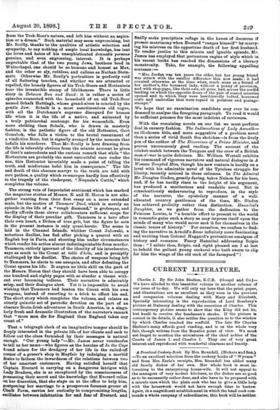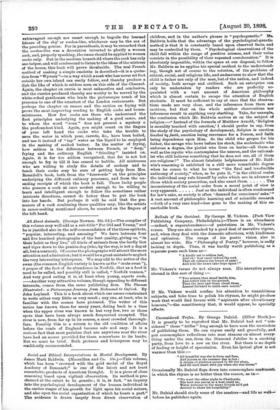A Practical Cookery - Book. By Mrs. Roundell. (Bickers and Son.) —To
an excellent selection from the cookery books of " Wyvern" and from Mrs. Earle's receipts, Mrs. Roundell has added many old family dishes of her own. Her whole book is most in- treating to the enterprising house-wife. It will not appeal to the managers of very modest kitchens, as the dishes are so good as to be necessarily rather dear, and also have to be prepared with a minute care which the plain cook who has to give a little help with the housework would not have enough time to bestow. Again, in a magnificent establishment in which the head cook com- mands a whole company of subordinates, this book will be neither extravagant enough nor smart enough to beguile the learned leisure of the chef or cordon-bleu, whichever may be the sex of the presiding genius. For in parenthesis, it may be remarked that the cordon-bleu was a decoration invented to glorify a woman rook, and, properly speaking, the name should be applied to women cooks only. But in the medium household where the cook has only one helper, and will condescend to listen to the ideas of the mistress of the house, this book will prove invaluable. The real French method of making a simple omelette is described—it is a quota- tion from "Wyvern"—in a way which a coek who has never set foot outside her own island can easily follow, and thereby produce a dish the like of which is seldom seen on this side of the Channel. Again, the chapter on currie is most exhaustive and conclusive, and the curries produced thereby are worthy to be served by the white-robed gentleman who lends the picturesque touch of his presence to one of the smartest of the London restaurants. But perhaps the chapter on sauces and the section on frying will prove the most improving reading to English cooks and house- mistresses. How few cooks are there who understand the first principles underlying the making of a good sauce, and to whom the word " roux " does not present a mystery o the profoundest kind. Again, you might count on the fingers of your left hand the cooks who take the trouble to save the water in which peas, carrots, &c., have been boiled, and use it instead of "tap" water as the liquid to be employed in the making of melted butter. In the matter of frying, how seldom is the difference between French, or "deep." frying and the ordinary English " frizzling " insisted on. Again, it is far too seldom recognised, that fat is not hot enough to fry in till it has ceased to bubble. All mistresses who are willing to study the details of cookery and to teach their cooks may be sure of getting help from Mrs. Roundell's book, both from the "forewords" on the principles underlying the different culinary processes, and from the un- ending receipts of which the book is fulL Those lucky people who possess a cook at once modest enough to be willing to learn and intelligent enough to follow the sometimes rather intricate directions, cannot do better than to put the book into her hands. But perhaps it will be said that the pos- sessors of a cook combining these qualities may, like the artists in sauce-making mentioned above, be counted on the fingers of the left hand.



































 Previous page
Previous page